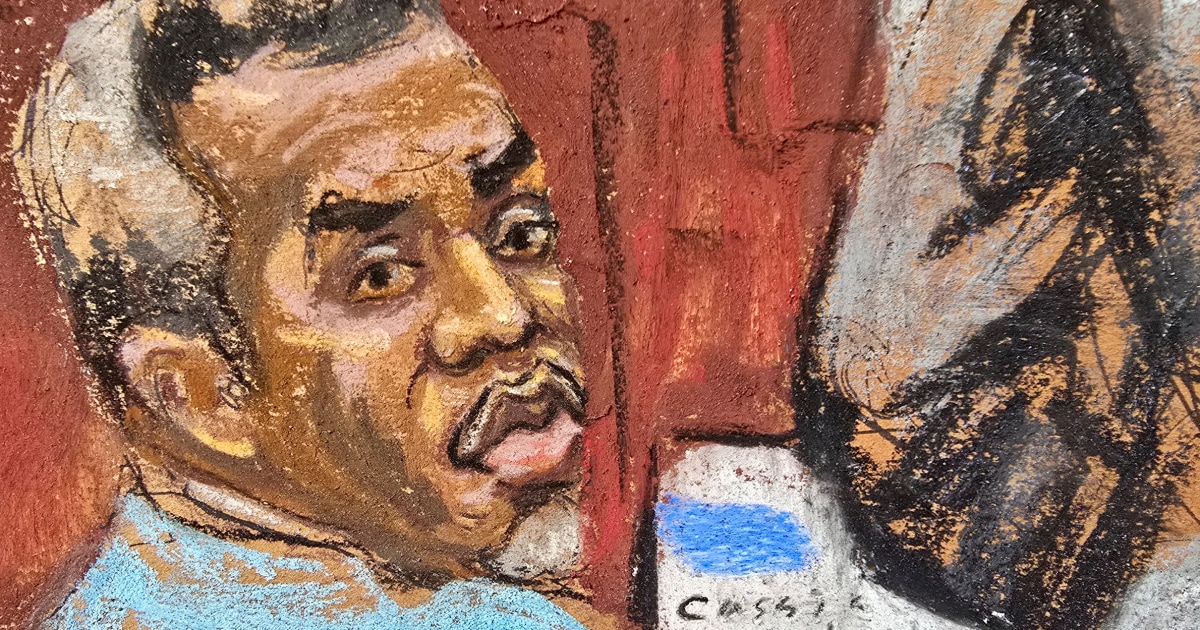

Despite his best dramatic effort in years, Leonardo DiCaprio scrambling through police raids and political riots in a bathrobe is only the third-strongest performance in One Battle After Another, Paul Thomas Anderson’s adaptation of Thomas Pynchon’s Vineland. The second-most captivating performance is Teyana Taylor playing a sexy, revolutionary dom. And the most indelible performance of all is Sean Penn playing the sandblasted Colonel Steven J. Lockjaw on a sad, strange journey to the dark heart of modern American paranoia about race.
Let’s set the scene a bit before getting into the meat of the portrayal. One Battle After Another takes some creative liberties not only with its source material—published in 1990, about the 1960s and ’80s—but also with the politics of our current century. The grand progressive cause of the 2000s, in this alternate reality, isn’t dismantling George W. Bush’s war on terror but rather resisting the very sort of immigration crackdowns that we’ve seen more recently under Donald Trump.
In the beginning, Colonel Lockjaw is the commanding officer at an immigrant detention facility in California, on the U.S.-Mexico border. The French 75, a far-left revolutionary faction, raids the facility and liberates the detainees in a spectacular show of force. During the nighttime raid, Perfidia Beverly Hills (Taylor) rouses Colonel Lockjaw in his quarters at gunpoint and, intending to humiliate him, commands the colonel to get an erection. The colonel obliges, and from here, as the revolutionaries flee the scene, he develops a perverse obsession with Perfidia. Lockjaw tracks the French 75 across a series of similar exploits and eventually blackmails Perfidia into a kinky liaison. This betrayal of her once passionate romance with DiCaprio’s “Ghetto Pat” snowballs into a broader betrayal of the French 75 once Perfidia is arrested for killing a security guard during a botched bank heist; Lockjaw offers her immunity and a new life in federal protection if she gives up the rest of the group. So Perfidia abandons Pat and their baby daughter, Charlene, though we eventually learn that Charlene’s biological father isn’t Pat but rather Lockjaw.
Unfortunately, in his later years, Lockjaw covets a rare invitation to join the Christmas Adventurers Club, a snobby fraternal order of white supremacists. The club offers membership to Lockjaw pending an exhaustive background check that’s already off to a rough start with the colonel lying in response to a screening question: Have you ever been engaged in an interracial relationship? So Lockjaw hastily sets out to locate the teen girl who may indeed be his half-Black daughter and, upon genetic verification of his paternity, kill her.
There’s the starkest of contrasts between the ugly severity of the colonel’s mission and the bug-eyed comedy of his portrayal. Penn for the most part plays Lockjaw for a joke, a painfully stiff and utterly clueless weirdo who seems to believe that he’s the T-1000 sweeping through the borderlands of the American Southwest when in reality he moves through this world with the bonkers haplessness of Wile E. Coyote. His portrayal is very evidently inspired by General Turgidson from Dr. Strangelove, with his shell-shocked skittishness and his pre-apocalyptic fervor. Lockjaw doesn’t walk; he marches, with the thorniest of sticks up his ass. The men who summon the colonel to a hotel room to offer him membership in their club tellingly route him through a back entrance; one of them explains to the corn-fed, khaki-wearing colonel that it’s best he not mingle with the black-tie attendees at a wedding reception in the main hall. This is the first of several friendly insults that the colonel absorbs with a shit-eating grin.
Lockjaw is the most curious creative difference between Pynchon’s novel and Anderson’s adaptation, so far as he embodies the movie’s unique interest in race. In Vineland, it’s the prickish federal prosecutor Brock Vond (the reference for Colonel Lockjaw) who woos and corrupts the roaming boho documentarian Frenesi Gates (the reference for Perfidia), in a story that’s more about the repressive political climate of the “silent majority” and the war on drugs. Vond is obsessed with power, and Gates is obsessed with sex; theirs is a romance that neatly encapsulates the left-right dynamics of the later third of the 20th century. The boomer revolutionaries of Vineland are battered by a series of ruthless counterreactions—Nixonism, Thatcherism, Reaganism—until the leftist dream is washed out and its restless agitators are washed up (or else sold out). In One Battle After Another, history belongs to men such as Colonel Lockjaw, an avatar of the modern right-wing counterreaction and of Trumpism, but a man who is an old dog himself, an old archetype. This isn’t a one-and-done struggle but rather a protracted tug-of-war that has spanned—will span—generations.
Lockjaw isn’t grasping for power via the Christmas Adventurers Club but rather acceptance; the club’s perks include lifelong support from “the greatest of friends.” This solidarity is shallow and short-lived, as the club inevitably turns up evidence of Lockjaw’s relationship with Perfidia and further evidence of his being the father of her child. The club might (you get the sense) overlook an indiscretion or two, if it were a fruitless tryst from the distant past, but Charlene is an uncomfortable hint at the absurdity of the club’s political project: The U.S. is too Black and too Mexican, too thoroughly mixed, too intrinsically pluralistic for a group of ideologues to somehow reverse engineer the country into 1980s South Africa, much less 1940s South Carolina. These gentlemen may as well be meeting in a tree house, playing poker, plotting a panty raid—just bullshitting. Alas, Lockjaw is so eagerly absorbed into these pointless war games, and the club’s shadowy members are seemingly wealthy and influential enough, to cause immediate harm to the anxious immigrant communities of Baktan Cross, where Pat and Charlene lie low for more than a decade under the new names Bob and Willa, respectively.
It’s here in this sanctuary city where Pat’s revolutionary past violently catches up with them. Perfidia was a “rat,” Charlene eventually learns. Pat, in contrast, was a “war hero” to the French 75, though the combination of fatherhood and seclusion reduced his revolutionary activity to imploring his daughter’s history teacher to properly problematize the Founding Fathers. Lockjaw, meanwhile, spends the rest of his days rehearsing his assigned prejudices after spending the first third of the movie declaring his attraction to Black women. Lockjaw is a hypocrite and a moron, but he’s ultimately an agent of the state, summoning a hit squad in his tireless pursuit of Pat and Charlene. Upon finally detaining his long-lost daughter, Lockjaw erupts into incoherence, vacillating wildly between wanting to get to know Charlene and simply wanting her dead. He ultimately outsources the deed to the Native American bounty hunter Avanti, because of course he does—his purposelessness culminates in indecision. He’s a coward either way.
In his grim little adventure, Lockjaw finds everything but purpose. He’s the enforcer of ideas he barely holds. Perfidia was a rat, indeed, but she was ultimately principled enough to awaken to the cravenness of her betrayal of the French 75, to abandon the nice digs in federal protection for an uncertain fate in Mexico, leaving a scribbled rejection of her baby’s father: This pussy don’t pop for you. Lockjaw never achieves such a liberation for himself; he does his dirty work until the bitter end.
Ultimately, the Christmas Adventurers Club delights in killing him twice over: First, one of its members shoots him on the highway, causing him to crash. But when that merely maims him, they pour poisonous gas into the cushy corner office of the club’s regional headquarters, where Lockjaw has been invited. He was given a choice: come to terms with the racial realities of one of the most thoroughly pluralistic societies in the history of this planet or meet a profoundly idiotic demise. For Lockjaw: a silent, slobbering send-off. For the rest of us: Time will tell.
Justin Charity
Justin Charity is a senior staff writer at The Ringer covering music and other pop culture. After years of living in D.C. and NYC, and a brief stint in Wisconsin, he’s now based in Cleveland, Ohio.Source link



